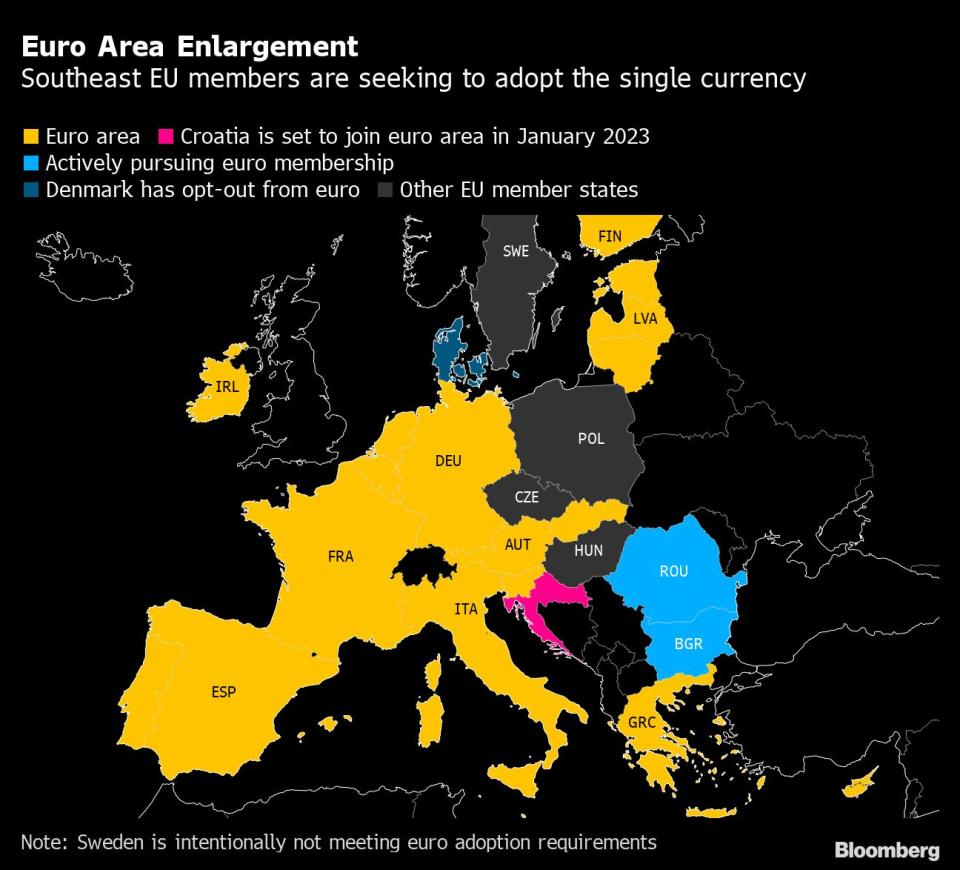Euro Goal Gets Tougher for Bulgaria After Inconclusive Vote
(Bloomberg) -- Bulgaria’s long odds on forming a government after an inconclusive election may hamper its euro adoption goals, a top official in the interim administration said.
Most Read from Bloomberg
Elon Musk Sets Off Uproar in Ukraine by Tweeting His ‘Peace’ Plan
Biden, Kishida Condemn North Korean Missile Launch Over Japan
Although he stood by a 2024 target date, Deputy Prime Minister Atanas Pekanov said political limbo could complicate Bulgaria’s path to joining the single currency. A day earlier, voters produced a likely hung parliament, cementing a fragmented party landscape in the Balkan nation’s fourth election in less than two years.
“It is definitely more difficult to go through all the processes sufficiently if you don’t have a stable government,” Pekanov, who serves in the caretaker administration appointed by President Rumen Radev, said in an interview in Sofia on Monday. Political instability “is putting the brakes on this,” he said.
Former Prime Minister Boyko Borissov came first in the contest, though the political isolation of the conservative leader -- who was voted out of office last year after mass protests against corruption -- means there’s no clear path for him to form a government.
Kiril Petkov, whose seven-month administration was toppled in June by infighting in his coalition, conceded defeat and largely ruled out a new bid at the premiership.
Should party leaders fail to form a coalition, Radev will be forced to call a fifth election -- prolonging political instability in the nation of 6.5 million, potentially for months.
The turmoil leaves a void that’s been filled by the interim government, which doesn’t have the political mandate needed for the European Union’s poorest member to clear the hurdles for euro adoption.
With the EU’s third-lowest debt level and a history of low fiscal deficits, Bulgaria meets most of the formal criteria to join the euro area. But banking troubles in the past and money-laundering scandals in the Baltics have raised skepticism among member states about accepting new members.
The Balkan nation’s euro aims will only become more complicated without a government backed by voters, according to Capucine May, an analyst at the Verisk Maplecroft intelligence company.
“In the absence of a strong hand to guide the economy, double-digit inflation, declining economic growth, and dwindling popular support will become key hurdles to Bulgaria’s accession to the euro zone in 2024,” May wrote in an e-mailed note.
Only 40% of Bulgarians support the euro as the bloc’s single currency, nearly half the EU average, according to a Eurobarometer survey published in September.
The deputy premier insisted that euro adoption would have “overarching” backing in parliament, though the interim government only has a narrow mandate to push through reforms.
“This is as far as a caretaker cabinet can go,” Pekanov said. “We need a regular cabinet with a long-term vision.”
(Adds analyst comment in ninth paragraph.)
Most Read from Bloomberg Businessweek
Millions in Cryptocurrency Vanished as Agents Watched Helplessly
Maine Lobster Union Points the Way for Organizing Gig Economy Workers
The Unstoppable Dollar Is Wreaking Havoc Everywhere But America
Big Pharma Is Chasing a $55 Billion Prize of Safer Blood Thinners
©2022 Bloomberg L.P.

 Yahoo Movies
Yahoo Movies 









